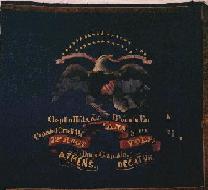


A BRIEF HISTORY OF THE 73RD INDIANA VOLUNTEER INFANTRY
The history of the 73rd Indiana Volunteer Regiment, the Civil War and South Bend are very closely linked. The 73rd was created when President Lincoln realized that he indeed was facing a protracted war and called for an additional 300,000 volunteers on July 1, 1862. Governor Morton of Indiana almost immediately asked that each congressional district raise at least one regiment. South Bend was in the 9th Congressional District and represented by Schuyler Colfax at that time and three regiments were actually recruited from the area. The 73rd had men from Lake, LaPorte, Porter, St. Joe, Marshall and Cass counties and within three weeks over 1,010 men were formed into companies and federalized on August 16, 1862. Company A was raised from the Crown Point area, B from LaPorte, C in South Bend itself, companies D and F were from Plymouth, E was from Chesterton which was known as Calument at that time, G and H from Logansport, I from Valparaiso and K from Michigan City. During this time the 87th and the 99th Volunteer Infantry Regiments were also being formed and federalized at Camp Rose which during the 1860's was the St. Joe County fairgrounds. (A historical plaque currently marks this sight in South Bend at the corner of Portage and Leland.) Gilbert Hathaway, a lawyer from LaPorte, was named the regiment's Colonel and Alfred Wade, from South Bend, was the Adjutant with a silk regimental flag being presented to the 73rd by Mr. and Mrs. Colfax as the men left South Bend to reinforce the union troops then being opposed by the southern forces under Braxton Bragg during the Confederate invasion of Kentucky.
Upon their arrival in Kentucky the 73rd was assigned to the Army of the Ohio being led by General Don Carlos Buell. During this time the regiment was involved in the pursuit of Southern troops commanded by Braxton Bragg which lead to the battle of Perryville, KY on October 8, 1862 followed by the march on Nashville, Tennessee. It was during this time that Colonel Wade's diary reflects the unrest in the Army of the Ohio in regards to Buell's failure to pressure Bragg after the Union victory at Perryville. A few of the soldiers even questioned Buell's loyalty to the Washington government and felt he was intentionally letting the Confederate army escape. This unease was also felt by others in the War Department and Buell was replaced by General William Rosecrans and the troops were reorganized as the Army of the Cumberland. General Rosecrans soon challenged Bragg at Stones River, Tennessee on December 31st, 1862. Here the 73rd and the 51st Indiana Volunteer played a key role early in the battle but when Rosecrans's right flank was nearly destroyed by Bragg's troops the Hoosiers were quickly called back. The fight was a terrible slaughter with the Army of the Cumberland estimated to have absorbed around 13,000 casualties while Bragg's army had nearly 10,000 however the Southern advance had been stopped. After Stones River the 73rd and 51st Indiana along with the 3rd Ohio and 80th Illinois were organized into a "provisional brigade" under the command of Colonel Abel Streight (from the 51st IVI) for a raid deep into Southern territory aimed at small manufacturing centers such as Rome, Georgia. To accomplish their goal, Colonel Streight proposed mounting his infantry regiments for a quick strike at Southern strategic sights. However a shortage of good horses forced the union troops to utilize unbroken mules and combined with an uncoordinated and tardy initial advance the raiders were soon fighting for their very lives in hostile territory. At the battle of Blount's Farm, just short of the target of Rome, the brigade was surrounded by a smaller but more mobile force of Confederate cavalry under the leadership of Nathan Bedford Forrest and was forced to surrender. It was at the fighting around Blount's Farm that Colonel Hathaway, the CO of the 73rd, was killed. The brigade was sent as prisoners to Richmond, Virginia where the officers, including Colonel Streight and Wade were held at the infamous Libby Prison. However, the enlisted men were soon exchanged and the 73rd was reformed at Indianapolis in December of 1863. Colonel Streight was involved in a daring escape from his Southern captors and returned to lead the 51st while Colonel Wade was part of an exchange deal for a Confederate officer brought about by the intervention of Schuyler Colfax, then the Speaker of the House of Representatives. After rejoining the 73rd in 1864, Colonel Wade assumed command and the unit was assigned to various garrison duties until the end of the war. The 73rd was mustered out at Nashville, Tennessee in July of 1865 having lost 3 officers and 41 enlisted men due to mortal wounds with another 191 dying from various diseases. After the war Colonel Wade became a prominent lawyer and the postmaster of South Bend (the position his good friend Schuyler Colfax once held) until his accidental drowning in the Kankakee River near Crum's Point, (now Crum's Town) in early 1877.
| 






